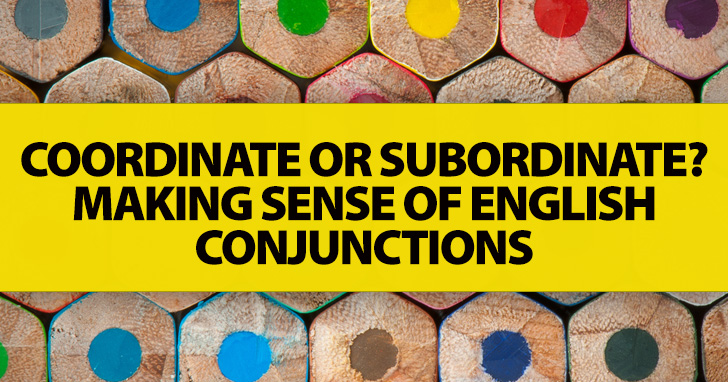“Conjunction junction, what’s your function…?”
If you every watched School House Rock, these words should sound familiar. Conjunctions are an important part of the English language because they connect clauses to make compound and complex sentences, sentences that are interesting and sophisticated. Different types of conjunctions do different things. Here is a quick review of these different types of conjunctions for your ESL students.

A Quick Review of Conjunctions and How They Make Better Sentences
-
1
Coordinating Conjunctions
Coordinating conjunctions are perhaps the easiest conjunctions to understand and apply in the English language. They join two independent clauses to make a compound sentence. In a compound sentence, both parts of the sentence have equal weight; they both have a subject and a verb and can stand on their own as an independent sentence. The use of a coordinating conjunction connects these two clauses to make a more interesting sentence. English has seven coordinating conjunctions: and, but, or, yet, so, nor, and for. English speakers use and to communicate the idea of addition. They use but and yet for a contrast. Or communicates a choice while nor says neither option is a choice. (Note, when using nor to join two independent clauses, the first clause should have a negative verb while the second clause has a positive verb. The negative in the second clause is linked to the use of nor.) So and for communicate a cause and effect relationship. When a coordinating conjunction joins two sentences, a comma comes after the first independent clause and before the coordinating conjunction.
- They went to the restaurant, and they went to the movies.
- He liked the movie, but he didn’t like the restaurant.
- He doesn’t eat soup, nor does he eat salad. (note the negative verb in the first clause and positive verb in the second)
Practice: To give your students some practice using coordinating conjunctions to form compound sentences, have pairs of students write one sentence with each coordinating conjunction, using commas correctly, on a sheet of paper. Then have them transfer each independent clause to a separate index card omitting the comma and the coordinating conjunction. Have each pair shuffle their cards and then exchange them with another pair in the class. Each pair must now try to find logical combinations with the independent clauses on the note cards and try to recreate and write down the seven compound sentences the first pair came up with.
-
2
Subordinating Conjunctions
Subordinating conjunctions are more complicated than coordinating conjunctions, as a rule. They join one dependent clause to an independent clause to form a complex sentence. The dependent clause, also called the subordinating clause, depends on the independent clause, or main clause, for its meaning. The dependent clause cannot stand alone though they can come at either the beginning or the end of a main clause. Some of the most common subordinating conjunctions in English are listed below.
Time clauses
After, before, once, since, till, until, when, whenever, and while are subordinating conjunctions which communicate a time relationship. Some of these words can also be used as prepositions (as can other subordinating conjunctions), so make sure your students can tell what role the words are filling in a sentence. If one of these words if followed by a noun or noun phrase, it is a preposition (e.g. after the party). If it is followed by both a subject and a verb, it is functioning as a subordinating conjunction in a complex sentence.- We will go to the restaurant after we go to the party. (subordinating conjunction)
- We will go to the restaurant after the party. (preposition)
Clauses of Contrast
Although, even though, rather than, though, and whereas all show a relationship of contrast between the main clause and the subordinating clause.- I will drive her to the airport even though I don’t like her.
- Rather than take a plane, I will take the scenic train.
Notice that, while most subordinating conjunctions are just one word, some consist of two or more words.
Comparison
As, as if, and as though all show a relationship between the main clause and the dependent clause which compares one to the other. While English speakers may use like in similar constructions, some grammar books say it cannot be used as a subordinating conjunction. You may want to point this out to your students.- He looked as if a dog was chasing him.
Condition
Sometimes the subordinate clause states a condition related to the main clause. The most common subordinating conjunction in this category is if, but others include as long as, even if, if only, and unless.- Unless he apologizes, I will not speak to him.
- I will only speak to him if he apologizes.
Place
When where and wherever are used as subordinating conjunctions, the dependent clause communicates something to do with place.- Your book must be wherever you left it.
Cause and Effect
Some subordinating conjunctions show a cause and effect relationship between the main clause and the subordinating clause. Such subordinating conjunctions include because, now that, so that, and in order that.- He aced the test because he studied all night.
In this example, the dependent clause causes the main clause to happen.
- He studied all night so that he would ace the test.
In this example, the main clause causes the dependent clause to happen.
-
3
Punctuating Subordinate Clauses
When a dependent clause starting with a subordinating conjunction comes at the end of the sentence, no comma is needed. When a dependent clause starting with a subordinating conjunction comes at the beginning of a sentence, it is followed by a comma.
- She went out with him because her friend wanted her to.
- Because her friend wanted her to, she went out with him.
- Neither of them had fun while they were on their date.
- While they were on their date, neither of them had fun.
- They will not go out again even if their friend asks them to.
- Even if their friend asks them to, they will not go out again.
Subordinating conjunctions are not the same as relative pronouns (who, which, and where), which follow different punctuation patterns.
Practice: To help students choose the correct subordinating conjunction in a sentence, give your students a list of several fill in the blank sentences where the subordinating conjunction has been omitted. Using a work bank, have students choose one or more answers which will correctly complete each sentence.
Conjunctions in English range from the simple to the complicated, but your students will have to be comfortable with all of them to reach fluency. Take some time to review these types of conjunctions with your students and you are sure to see their written and spoken English improve and their sentences become longer and more complex and more like those of native speakers.
What are your favorite exercises for practicing coordinating and subordinating conjunction use?
P.S. If you enjoyed this article, please help spread it by clicking one of those sharing buttons below. And if you are interested in more, you should follow our Facebook page where we share more about creative, non-boring ways to teach English.







